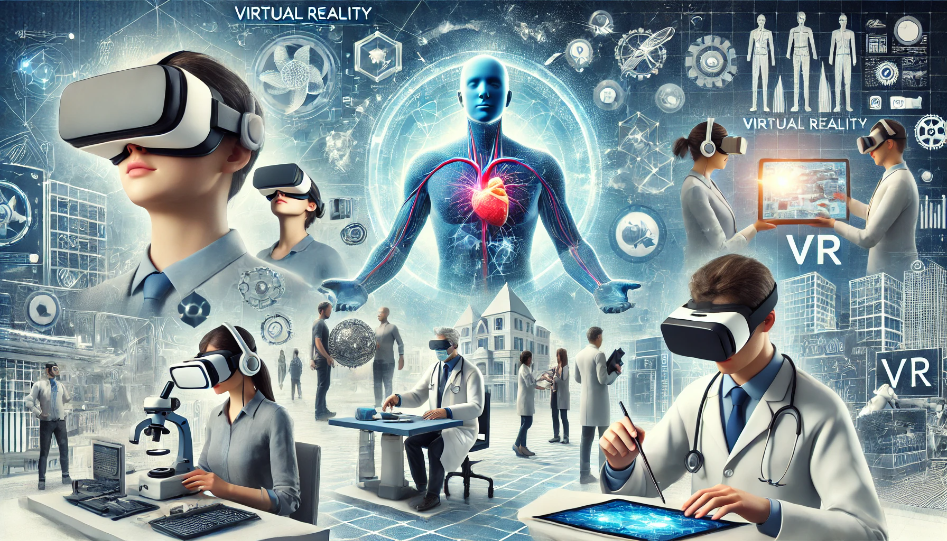The Rise of Virtual Reality (VR): Revolutionizing Digital Experiences

Virtual Reality (VR) is rapidly transforming how we interact with digital content, creating immersive environments that allow users to step into entirely new worlds. From gaming and entertainment to education and healthcare, VR technology is reshaping industries and providing innovative ways to engage and connect. At SmartBooksBuzz, we explore how VR is leading the charge in the digital revolution and the many ways it’s influencing modern life.
What is Virtual Reality (VR)?
Virtual Reality (VR) is a technology that generates a completely simulated environment, allowing users to experience and interact with a 3D world. Unlike Augmented Reality (AR), which overlays digital elements onto the real world, VR creates an entirely new digital space, immersing the user through headsets, sensors, and motion-tracking technology. This makes the user feel as though they are physically present in a virtual environment.
How Virtual Reality is Transforming Industries
Just like AR, VR has broad applications across multiple sectors. Here’s how various industries are benefiting from the integration of VR:
- Gaming and Entertainment
VR has revolutionized the gaming industry by providing fully immersive gaming experiences. Players can now explore virtual worlds in 360 degrees, interact with objects, and engage with characters in real-time. Beyond gaming, VR is being used in entertainment, such as virtual concerts, cinema, and theme park experiences, offering a more immersive form of storytelling. - Education
In education, VR is taking learning to a new level. Students can now take virtual field trips to ancient civilizations, walk through historical events, or explore the depths of the ocean—all from the comfort of their classroom. By using VR, educators can provide students with experiences that would otherwise be impossible, enhancing learning through immersion. - Healthcare
VR is also making waves in healthcare. Surgeons use VR simulations to practice complex procedures before operating, while mental health professionals use VR therapy to treat patients with anxiety, PTSD, and phobias. This technology offers a safe and controlled environment for both learning and healing, making it a valuable tool in the medical field. - Training and Development
Many industries are adopting VR for employee training, allowing for hands-on learning in a risk-free environment. From flight simulators for pilots to virtual training grounds for military personnel, VR provides realistic simulations that prepare workers for real-world scenarios without the associated risks. - Real Estate and Architecture
VR is transforming how people buy and sell real estate. Potential homebuyers can now take virtual tours of properties from anywhere in the world, while architects use VR to present their designs to clients, allowing them to walk through 3D models before construction begins.
The Business Potential of VR
For businesses, VR presents a unique opportunity to create highly engaging customer experiences. From virtual showrooms and interactive product demos to VR-enhanced marketing campaigns, companies that incorporate VR can provide customers with personalized, memorable interactions. Additionally, VR opens the door to remote collaboration, enabling teams to work together in virtual spaces from different locations.
The growth of VR also offers new avenues for content creators, designers, and developers. As hardware and software evolve, the demand for VR content will continue to rise, offering significant opportunities for innovation and entrepreneurship.
The Future of Virtual Reality
As VR technology advances, its applications will continue to expand. Industries such as tourism, fitness, and retail are already exploring the possibilities of VR integration. The development of lighter, more affordable headsets will also make VR accessible to more people, ensuring that it becomes a mainstream technology.
VR is often discussed in conjunction with Augmented Reality (AR), as both technologies are part of the larger immersive tech ecosystem. To learn more about how AR is impacting industries today, check out our article Exploring the Impact of Augmented Reality (AR) in Modern Life.
Conclusion: Virtual Reality’s Role in Shaping the Future
Virtual Reality is more than just a gaming novelty—it’s a tool that has the potential to change how we work, learn, and interact with the world around us. At SmartBooksBuzz, we’re excited to explore the ways VR continues to evolve and the opportunities it presents for innovation in business, education, and beyond. With VR, the future is limited only by our imagination.
Explore more about cutting-edge technologies like VR and AR, and how they’re influencing our world, at SmartBooksBuzz.
